Is it true that humanity is becoming stupid?

There is such a joke: the amount of intelligence on the planet is constant, and the population is growing all the time. But is this really a 100% joke? Or do we still become more stupid? The fact is that over the past 25 thousand years our brain has become smaller. The anthropologist Stanislav Drobyshevsky talks about this and the vicissitudes of human evolution in the next issue of our friends, the channel Sci-One TV. Read the text version under the cut.
If you trace the evolution of the brain from Australopithecus , the first two-legged, to modernity, it turns out:
')
- Brain growth was nonlinear, bursts, faster, then more slowly, sometimes decreasing.
- The size and shape did not change synchronously. As a rule, at first the size slightly increased, then the shape changed. And even different parts of the brain did not change simultaneously.
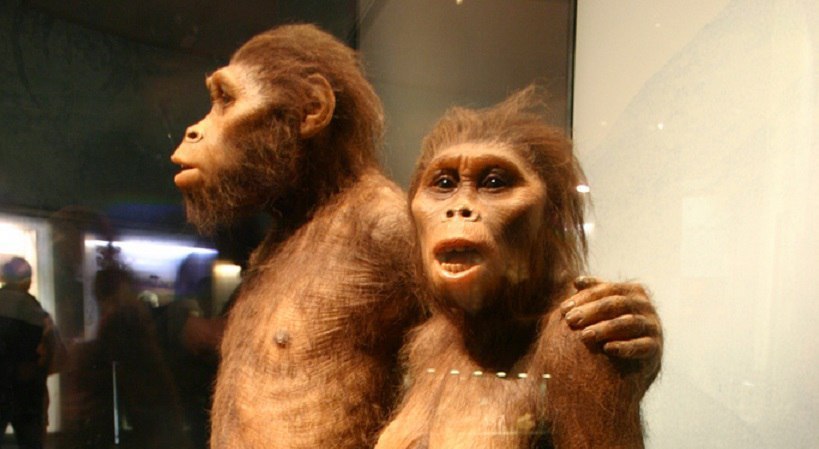
We do not know all the details of this evolution, but its task has never included the creation of big brains. Each subsequent change in the structure, size, shape, function was the answer to some external conditions. The environment was changing, life was setting new tasks, the body gave new answers. And most often it turned out that the answer was in the form of even greater insight. Apparently, to a large extent because not only people have become smarter. If you look at the evolution of any kind of animal, then cephalization - an increase in the brain - is characteristic of all. Therefore, since our ancestors did not live in a vacuum, they communicated with other creatures. They hunted for them, ran away from those who hunted them. And they had to do it better and better, because other creatures ran away and hunted better and better. To run as fast as an antelope, a person will never succeed, and it is possible to outwit antelope. But here it is necessary to get smarter at a faster pace, which our ancestors did.
Sometimes the conditions are such that it is possible not only not to get wiser, but even to stupid a little. And in evolution there are at least two such examples. The first is the so-called Hobbits of Flores , ancient people who lived between 190 and 50 thousand years ago on the small island of Flores in Indonesia. Their ancestors got there about a million years ago, most likely from Java. These were the classic exemplary Javanese Pithecanthropes .
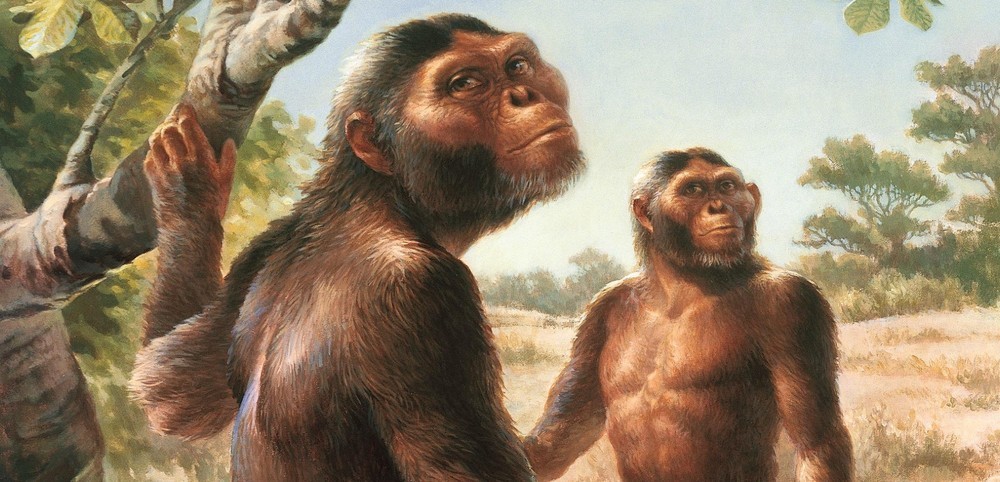
Over the next few hundred thousand years, they have drastically decreased in size. As recent research shows, their brains began to weigh 420 grams or less. Besides, the Pithecanthropus ancestors had a brain about a kilogram. Of course, not like ours, but even a kilogram is not so little. It was quite enough to make stone tools, hunt animals, and so on, that is, they were quite people. And Homo floresiensis brains reached the level of Australopithecus and modern chimpanzees.
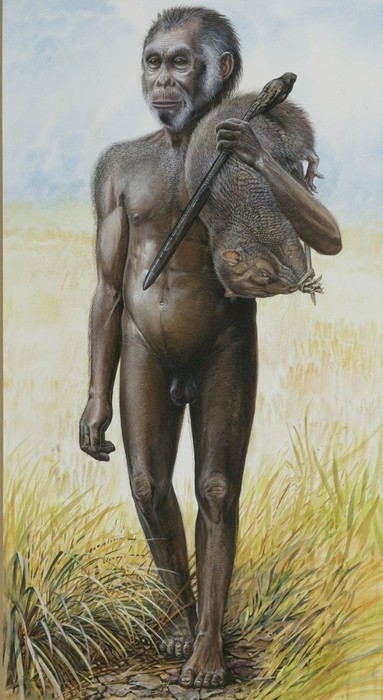
At the same time, surprisingly, they did not cease to manufacture tools, which also decreased in size. The first implements on Flores are healthy cobblestones, stone choppers. The hobbits, they turned into small flakes, because the foot they have decreased. Hobbits hunted animals, the fauna there was very peculiar: giant half-meter rats, monitor lizards, dwarf elephants stegodons under two meters tall. But the hunters themselves were two times lower. And there were also giant storks, about 1.8 m in height. With the growth of hobbits per meter, this was, in general, impressive.
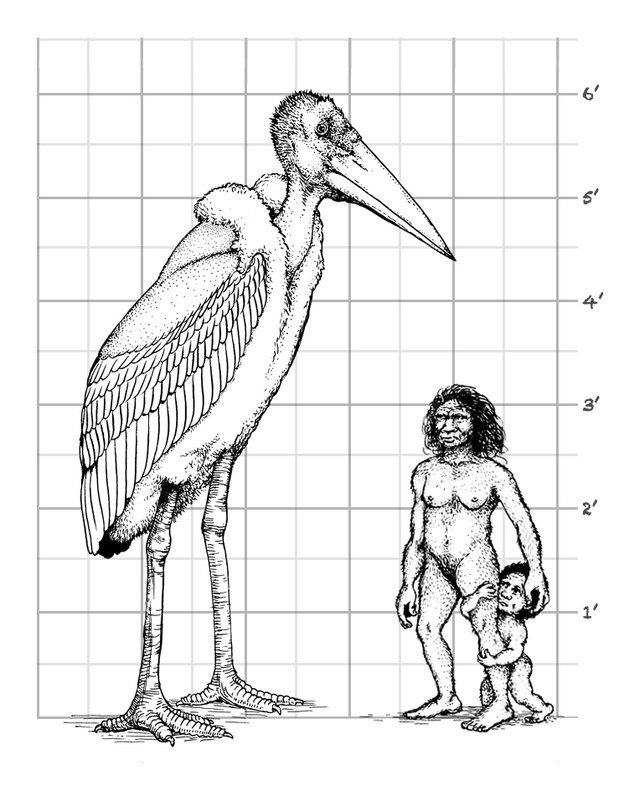
The life of these hobbits was not to say that it was very fabulous, because the same storks or monitor lizards were chasing them. But too much intelligence to run away from the monitor lizard or catch a rat is not necessary. With an elephant, probably more difficult, but, as architectural practice shows, hobbits hunted young stegodons. Probably because they were still inexperienced. Or maybe they just found the carcasses of dead elephants.
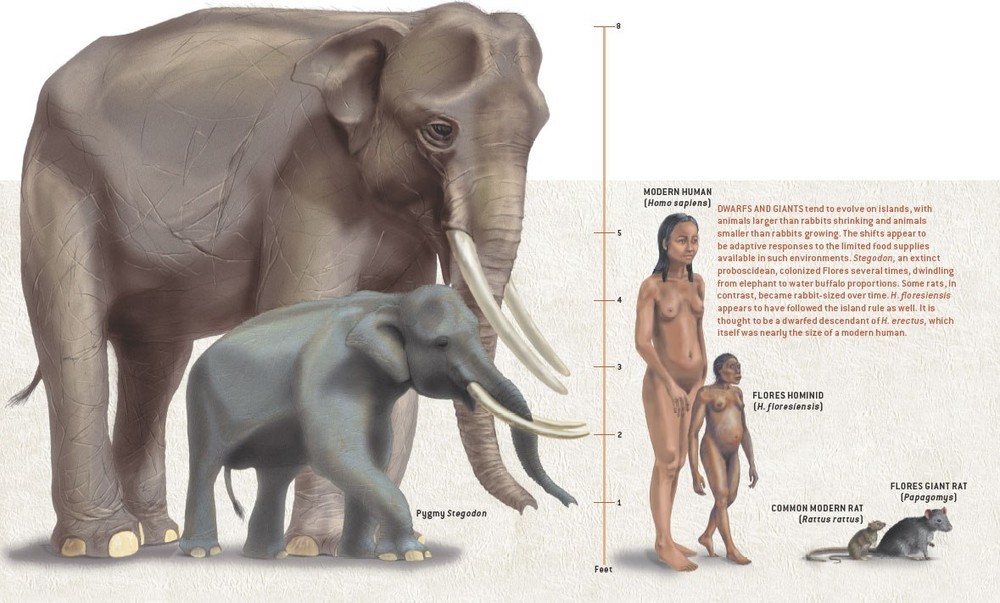
The second example of a decrease in the brain in the course of evolution is, oddly enough, ourselves. In the era of the Upper Paleolithic - from 40 to 25 thousand years ago - the average brain size of men was 1500 grams. And in modern men - already 1400 grams. It is clear that this is the average value of the planet, and there is a fairly large variation from group to group, depending on the territory. In some groups, the brain size has become even larger. For example, the Kazakhs, Buryats and Mongols have the biggest brains today, even more than during the Paleolithic era. But in general, the dynamics of the planet is negative. 100 grams - the difference is not specific, but rather decent. And there is a big sharp question: why did this happen? Is a decrease in the size of the brain due to the fact that we have become stupid, or has it gone unpunished?
There are two main points of view. The first is optimistic. According to this point of view, the brain has become smaller, but at the same time more difficult at the level of the structure of neurons , synapses , chemistry of neurotransmitters , etc., therefore we have become smarter. Indeed, practice shows that the intelligence of a modern person is not particularly dependent on the size of the brain. A decrease in intelligence is observed with a brain mass of less than 700 grams. And everything that is more is no longer correlated with the degree of development of the mind. What is more important is not the amount of nervous tissue, but the number of connections between neurons, the ability to transmit impulses, the speed of transmission, the branching of dendrites, and much more. We are almost unknown to such details of the structure of the Cro-Magnon brain, the first sapiens. Therefore, the version that the brain has become more difficult, currently unprovable. But, in principle, it is verifiable, because we know all the genetic information of ancient people. And if we knew how brain formation is encoded in genes, we could evaluate its structure in ancient Cro-Magnon men. Unfortunately, not a single modern geneticist knows this.
The second point of view is that the biochemistry and neural structure of the Cro-Magnon brain is basically the same as it is now. I share this opinion, because from the point of view of evolution, not much time has passed. If we compare the Cro-Magnons with the modern people in the structure of the face, hand, foot and spine, the differences will be barely noticeable, on the verge of statistical error. Most likely, the brain also changed slightly, except for its size.
Perhaps a decrease of 100 grams made us individually a little more stupid. After all, we do not need to be as smart as the Cro-Magnons. 25 thousand years ago, a Cro-Magnon was supposed to learn how to make tools, light a fire, build a house, hunt mammoths, saigas, zebras, kangaroos, anyone, know poisonous and edible plants and mushrooms, how to escape from predators . And he had no right to make mistakes, because there were not a lot of experienced people in the groups, there were no old people, there was no writing. The Cro-Magnon had to memorize from the first and forever, and to think very quickly in order to survive. The selection was tough. It was necessary not only to learn everything as soon as possible, but also to teach my children in a waltz tempo.
Over time, life expectancy began to grow, grandmothers, grandfathers, and writing appeared; nurseries, kindergartens, schools and universities appeared; an opportunity to learn everything at any time. It is no longer necessary - and it is impossible - to know everything in the world, each of us is familiar only with a small fragment of the universe. For example, I know how to talk about our ancestors, about our past and a little about the future, and I don’t know how to survive in the forest in winter. Like the vast majority of modern people. There are mega-survivors, but they hardly know, for example, how their boots are made. Each person knows only a tiny piece of the mosaic, and no one can grasp the big picture with reason. But we, for our piece of the mosaic, do not need too many brains. And so it is possible to live. Even when a person is born with a small brain, and, perhaps, with a reduced ability, then this is enough for him to do some specific work. And so the gene pool of modern people over the past thousand years has been constantly diluted with the genes of the owners of not the most distinguished brains.
If this trend continues, and the population grows, specialization increases, then the brain can decrease further. Even hobbits with their 400 grams in their heads made tools. So the further evolution of our brain depends only on the conditions in which our descendants live, what conditions they create for themselves. So far we have more to break our habitat, but I want to believe that we are still not in vain called Homo sapiens.
All successful evolution, and may science be with you!
Source: https://habr.com/ru/post/395549/
All Articles